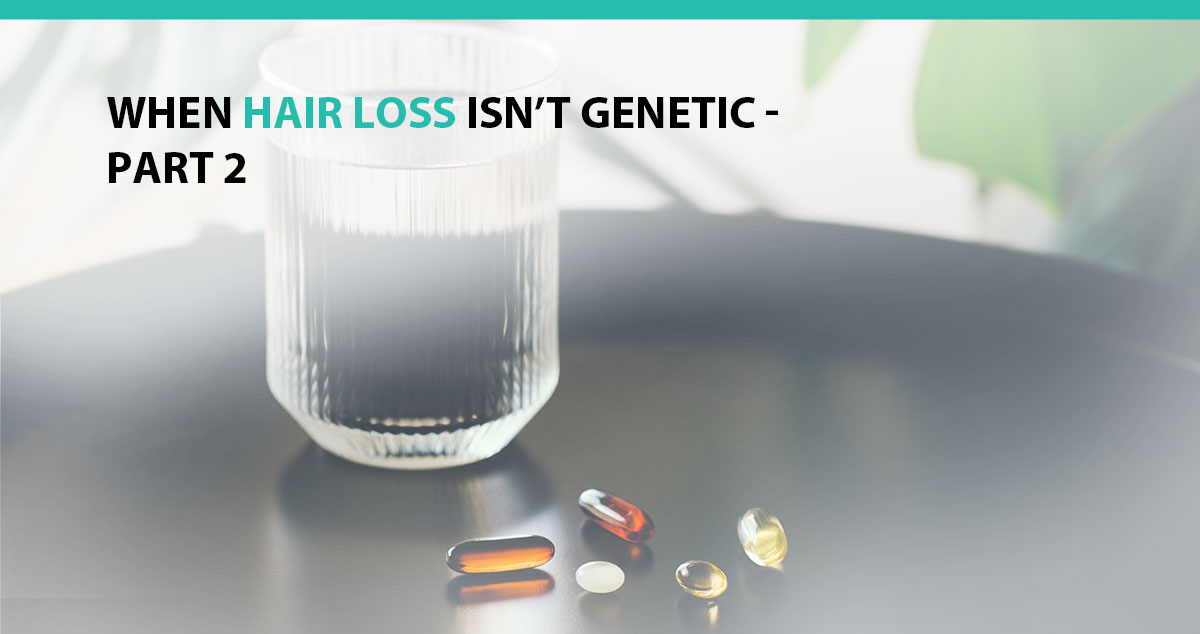
Deficiencies
We recently touched on autoimmune disorders like Lupus and Diabetes, as well as hormonal disorders and local infections. This week, we will discuss more causes of non-genetic hair loss, focusing on deficiencies.
Vitamins
Biotin, riboflavin, folate, and vitamin B12 deficiencies have long been associated with hair loss. Research is in various stages, depending on which vitamin/supplement. And it is important to note that not all studies have shown a direct link between overcoming the deficiency and improving the results of the hair condition. Some of the research has shown a clear relationship between deficiencies and hair loss, but further studies are needed to verify the success of supplementation in the industry, as medicine is FDA regulated and supplements are not.
Iron Deficiency Anemia – Very low serum ferritin levels have been associated with a connection to hair loss, specifically Telogen Effluvium.
The most common form of iron deficiency is Iron Deficiency Anemia (IDA), which causes a chain reaction that affects humans on a cellular level. Iron helps make new red blood cells in your body, which then provide oxygen to body tissues and organs – including hair follicles.
With IDA, the basic building blocks of healthy cellular growth are inhibited because of these chain reactions, which is why researchers are still trying to determine the exact connections between this iron deficiency and hair loss and the best path for prevention.
While IDA is most common among women and children, men are still susceptible to it as well, so it is important to address any iron deficiency concerns with your primary care doctor, who will likely order blood work from the lab as a starting point.
The link between the two is a topic of increased research lately, but early evidence points to hair restoration once the deficiency has been overcome.
Protein
Hair production occurs through mitosis, a process that multiplies cells around the follicle. These cells form the hair shaft and influence its growth, which requires a lot of nutrients to support the creation of new cells. Any interference with mitotic activities has adverse effects on your hair’s health. Protein deficiency causes or worsens hair loss, as well as impacting ongoing hair loss treatments.
How to Tell If Your Hair Needs More Protein
If you notice the following features, there’s a high probability that your hair receives inadequate protein:
- Porous hair: High porosity makes your hair absorb water easily. The results include tangled and frizzy hair.
- Stringy or limp hair: Stringy hair is a clear symptom of inadequate protein intake. Increasing this nutrient in your diet also improves hair volume.
- Low elasticity: A surefire way of testing hair elasticity is to wet a strand and pull it. Healthy hair should bounce back without breaking.
- Damaged hair: If your hair has split ends, is brittle, dry, or generally hard to manage, it means it’s damaged. The more protein you take, the healthier it becomes.
Water
Water makes up around 25% of the hair shaft, making it just as essential to hair health as proper nutrition. Long-term dehydration causes your body to prioritize how it will use the little water it receives. It reroutes this valuable nutrient from your skin, nails, and hair, then commits it to more vital body organs.
As your integumentary system goes without adequate water, your follicles struggle to produce new hair. Ultimately, you’ll shed more hair than your body can replace, which causes thinning or baldness. It’s advisable to drink at least 3 liters daily to boost hair growth and your overall health. Other than simply quenching thirst, water supports vitamin absorbency, which also contributes to healthy hair.
How to Stay Hydrated
Some people think drinking more than three liters of water daily is hard. It’s possible if you follow these tips:
- Keep water close
You’re more likely to drink water if you have it nearby. Make a habit of carrying a liter bottle to work or in your bag when running personal errands. You’ll hit your target if you sip small amounts at regular intervals throughout the day.
- Try flavored options
There are healthy flavored alternatives if you find it hard to drink liters of “tasteless” water. They include adding sliced fruits and veggies such as lemons, cucumbers, and strawberries. If you must buy flavored options, avoid artificial sweeteners. It’s also advisable to minimize or eliminate sugar-rich beverages such as soda, energy drinks, and lemonade.
- Use an app
There are countless fitness and health apps for both iOS and Android devices. They include hydration apps such as Hydro Coach, WaterMinder, Aqualert, My Water, and Drink Water Reminder. They help you set daily goals, create custom healthy drinks, and sync with other wellness apps such as Google Fit.
- Adopt a healthy diet
Alcohol, some sodas, and other drinks can increase dehydration. Drink lots of water to counter the loss and incorporate water-rich foods into your diet. They include watermelon, strawberries, tomatoes, plain yogurt, cabbage, peaches, oranges, cauliflower, cucumber, skim milk, grapefruit, cantaloupe, lettuce, zucchini, and celery. Broths and soups also promote weight loss due to their low calories while increasing your water conten
- Mark your bottle
You can place marks on your water bottle to help you hit your hydration goals. Most fitness bottles are premarked to show you how many ounces and liters you consume every few hours.
Stay tuned here for more updates regarding non-genetic causes of hair loss, including aging, physical trauma, medical treatments and medicines, environmental, and more. If you are experiencing hair loss and would like to find out more about our procedures, schedule a consultation with us today.










